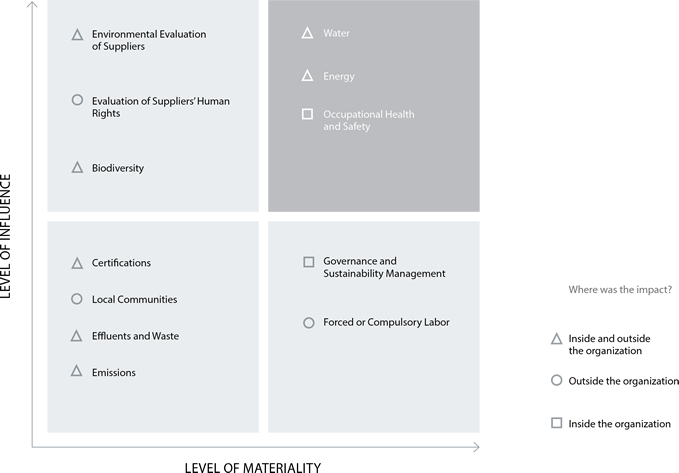- Decrease font
- Increase font
-
Click here to bookmark this page
My Bookmarks
×Customize your Bookmarks:
- Type the name of the page the way you would like it to appear in "My Bookmarks";
- Click in the "Add as My Bookmarks" button.
To choose your favorite sessions, please click here.
- Send a friend
About the Report
[G4-17 / G4-18 / G4-19 / G4-20 / G4-21 / G4-22 / G4-23 / G4-24 / G4-25 / G4-26 / G4-27 / G4-28 / G4-29 / G4-30 / G4-31 / G4-32]
The following sections of the International Paper LATAM Sustainability Report present details of the Organization’s performance in 2013 in the financial, social and environmental spheres. For the fourth consecutive year, we adopted the guidelines of the Global Reporting Initiative (GRI), which has established measurement and reporting standards that have been adopted by companies around the world. For the first time, the contents were prepared based on the GRI’s G4 version, which instituted certain conceptual changes. Whenever relevant, data comparability has been maintained.
In order to prepare this report, International Paper. with the help of BSD Consulting, expended intense effort on constructing a materiality matrix, identifying the most important topics through a benchmark study and sector analyses, involving segment studies, public and sector documents, and pulp and paper industry media publications, as well as, clearly, IP’s own policies, long-term and voluntary goals, global and Brazilian sustainability reports and global sustainability strategy, in turn involving interviews with the Company’s senior executives and engagement and dialogue with the Organization’s existing stakeholders. With respect to the latter, it is worth remembering that, in 2012, IP had already conducted an online survey of its main stakeholders—clients and consumers, local communities, suppliers and service providers, government and business associations, the media/press, NGOs, employees, unions and universities—to determine which matters they considered to be the most important. These stakeholders were in turn defined by an internal analysis, led by the sustainability area.

As a global leader in uncoated papers, International Paper produces an average of 1 million tons of paper per year.
By cross-referencing the GRI aspects and the results of the survey, the Company arrived at a list of recommended matters, which were analyzed in terms of their influence on the assessments and decisions of stakeholders, and their reflection of the organization’s economic, environmental and social impacts. The core information for each of these aspects was analyzed in order to identify the low, medium, high and very high level of materiality of the topics in the first phase of the process.
The topics classified as very highly material were Water, Energy, and Occupational Health and Safety, while those classified as highly material were Supplier Environmental Assessment, Supplier Human Rights Assessment, Biodiversity, Certifications, Local Communities, Effluents and Solid Waste, Emissions, Governance, Management for Sustainability, and Forced Labor.
Topics of high and very high materiality vs. Impact limits

The content of this report was defined based on the aspects and topics of high and very high materiality, resulting in: 12 material topics (10 GRI G4 aspects and two topics important to IP but not included in the guidelines) and a total of 26 G4 indicators.
The aspects and topics classified as highly and very highly material were then subject to an impact limit analysis in order to discover if the impact is related to economic, environmental or social matters; who it affects and where it occurs (in this case, IP’s industrial and forestry activities, surrounding communities, suppliers, clients and natural resources were taken into consideration); and if the impact takes place inside the organization, outside the organization or both.
This report covers IP’s units in Mogi Guaçu and Luiz Antônio (SP), as well as the Três Lagoas unit (MS). Due to negotiations with the Orsa Group (see item G4-13, herehere) the Company also decided to report the three most material aspects of the Orsa IP units: Paulínia (paper and packaging), Franco da Rocha (paper), Rio Verde (packaging), Manaus (packaging), Suzano (packaging) and Nova Campina (paper).
The GRI G4 “in accordance” option chosen by IP was Core, with self-declared adherence by the Organization, supported by BSD Consulting. The Sustainability Report was prepared with multidisciplinary and cross-sector participation throughout the Company, led by IP’s Sustainability Committee with the help of useful input from various Company departments. For more information or comments on this publication, please send an email to sac@ipaperbr.com or call 0800 70 300 70, Monday to Friday from 9 a.m. to 5 p.m.

